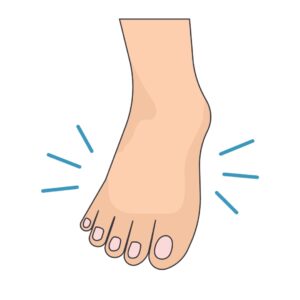Diabetes - Podiatry
Diabetes & your feet
Diabetes is a life-long condition which can affect the nerves (neuropathy) and circulation (ischaemia) to your feet. This can happen so gradually that you are not aware of it. Loss of protective sensation means you can hurt or damage your feet without feeling anything and poor circulation means you are less able to heal any wounds that may occur.
When you are diagnosed with diabetes, you will have your feet screened by a suitably trained healthcare worker to determine whether your feet are at low, moderate or high risk of developing problems:
- If you have low risk feet and no podiatry problems, you will be given basic foot care advice for maintaining healthy feet.
NOTE – You can check your own feet using this national tool – Touch the toes test. It is easy to use and supported by Diabetes UK. You could ask your family or carer to help you. If you’re not sure of anything, please ask your health care professional. You can also contact our General Podiatry Service Hub if you have any concerns. - If you have moderate risk feet you will be offered regular appointments at your local podiatry service for review or treatment as required.
- If you have high risk feet you will be offered more frequent appointments for review or treatment as required.
- If you have non-healing wounds or ulcers on your feet you will be referred to the specialist diabetes foot care service at your local hospital. Your care may be shared with community podiatrists and /or nurses. Visit Diabetes UK’s ‘‘Diabetes and foot problems page’ for information on how you can reduce the risk of diabetes-related foot problems.
The most effective way of preventing poor circulation and nerve damage is by keeping good control of your diabetes, cholesterol levels and blood pressure and not smoking.
Improved diabetic control can be achieved by regular exercise, healthy eating and making sure medication is taken appropriately.

Accessing general podiatry services
If you have any concerns about your feet, you should initially contact the General Podiatry service hub on 01698 753 753.
- This service is available Monday to Friday, 8am – 6pm. It is closed on public holidays and is not an emergency number.
- You will be given advice and/or an appointment for your foot condition to be assessed and treated as required.

Diabetes specialist podiatry service
If you have a wound that is deteriorating or non-healing or you have a suspected Charcot Foot, your Podiatrist will refer you to one of the hospital-based Diabetes Specialist Podiatry teams.
Once referred to the Diabetes Specialist Podiatry team, you will be triaged and seen as quickly as possible by a specialist Diabetes Podiatrist. You may also have a review with the larger multi-disciplinary team, including a Consultant Diabetologist, Orthotist and Vascular team – if necessary for your foot condition.
Patient foot information leaflets
There are useful Diabetes information and advice leaflets from the Foot Action Group below or you can visit Diabetes in Scotland website publications page.
Foot Risk Stratification & Triage (English)
High Risk of Non-healing Wounds and Amputation (English)
Looking After Your Foot In Remission (English)
Low Risk of Developing Non-healing Foot Wounds (English)
Moderate Risk of Non-healing Wounds and Amputation (English)
Information for professionals
The Scottish Diabetes Foot Action Group has developed a new online foot screening training module. This is part of the targets set out originally in the Diabetes Action Plan 2010. The ethos behind this training is to encourage any health care professional/worker involved in the care of a patient with diabetes to carry out foot screening and provide them with the competencies/confidence to do so.
- View the diabetic foot risk stratification and triage (traffic light) document
Foot Risk Awareness and Management Education (FRAME) provides an interactive way of learning and uses animations and case scenarios.



